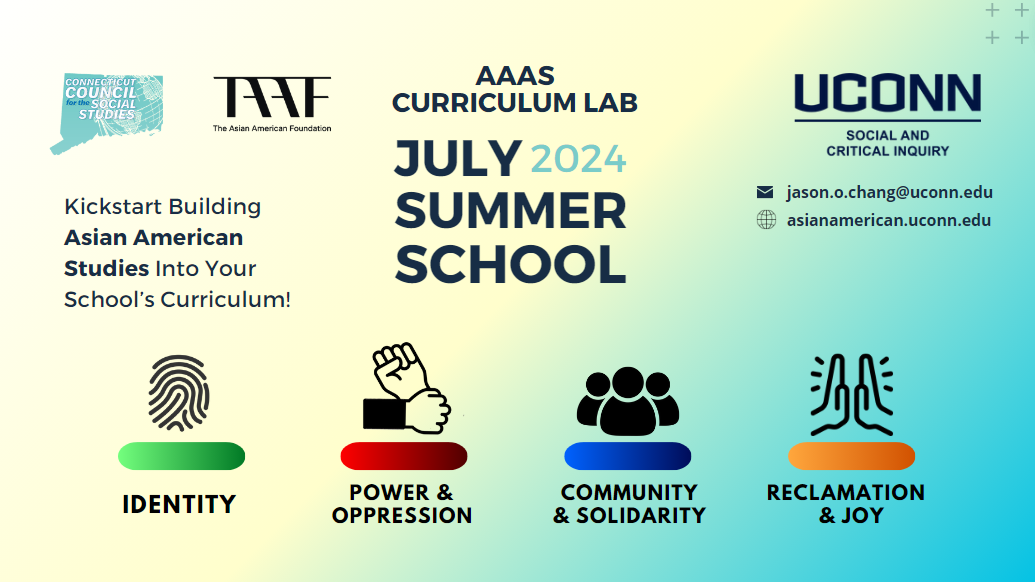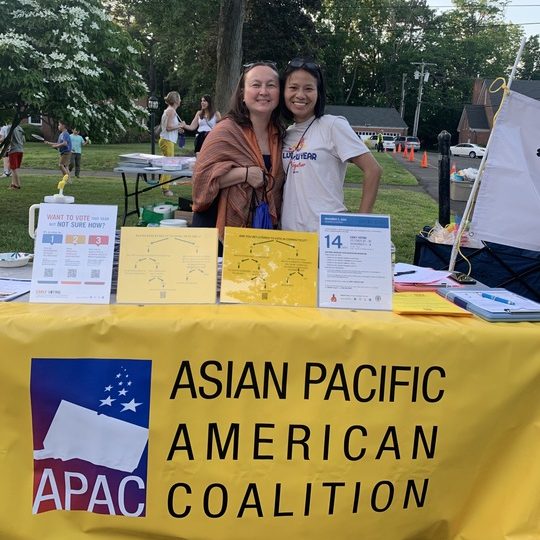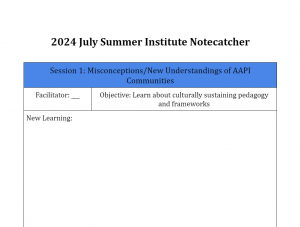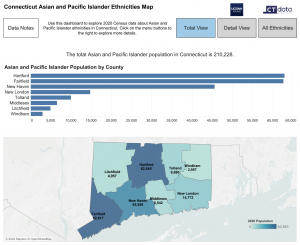The Asian and Asian American Studies Curriculum Lab at the University of Connecticut invites K-12 public school teachers to the July Summer School. In support of PA 22-80 mandating the inclusion of Asian American and Pacific Islander history, culture, and civic contributions, the Lab has assembled a 3 day Summer School program to LEARN, CONNECT, and WRITE lessons about Asian Americans. This unique program involves Asian American communities as a resource for lesson design and curriculum writing.
LEARN about Connecticut Social Studies standards, grade level inquiry standards, and major themes in Asian American studies.
CONNECT the skills of culturally sustaining pedagogy, knowledge of local communities, Asian American studies inquiry and Social Studies content standards.
WRITE original lesson plans for use in schools across the state through our guided workshops by collaborating with other teachers.
3 Places, 3 Days, $300! To Kickstart Building Asian American Studies into Your School's Curriculum
- Eligibility All Connecticut public school teachers in K-12
- Compensation Participants who sign the consent form, attend all three days’ events, and complete two lessons by end of day July 26, 2024 will receive $300.
- Resources Participating teachers will also receive a free Teaching Asian American Studies Book Bundle to support continued learning and lesson development.
2024 July Summer School Schedule
Parking Info
Saturday | Jul 20th
- Street parking near St. Mark the Evangelist Church
Contact jason.o.chang@uconn.edu for further questions regarding parking!
Prep | Homework
Saturday Prep
Fill out the Pre-Reflection Google Form by July 20th!
This article from Connecticut Public Radio explains how the West Harford Asian Night Market came to be! Please read the following article by Saturday July 20th!
Saturday Homework
Fill out the Night Market Reflection Google Form by 7pm on Sunday July 21st!
By Monday July 22nd read at least two chapters of your choice from our provided Book Bundle!
Schedule | 6:30 PM - 8:00 PM
- 6:30 PM Check In
- 6:45 PM Intro
- 6:45 PM Book Bundle
- 7:00 PM Activity Sheet
- 8:00 PM Closing
Parking Info
Monday | Jul 22nd
- Connecticut Convention Center
- 100 Columbus Blvd, Hartford, CT 06103
- Pick up parking validation card at workshop
Contact jason.o.chang@uconn.edu for further questions regarding parking!
Where to Meet
Where to Meet
- 10 Prospect St. Hartford, Ct 06103
- Hartford Times Building (HTB 219)
- Google Map Directions
Prep | Homework
Monday Prep
Please bring a charged computer in preparation for the workshop!
Monday Homework
This is the Asian American Studies K-12 Framework from San Francisco State University! Please go through this framework as a homework for Monday, due by Tuesday July 23rd.
Schedule | 9:00 AM - 3:00 PM
- 9:00 AM Breakfast
- 9:20 PM Intro
- 10:05 PM Understanding AAPI
- 11:05 PM Break
- 11:15 PM Content Standards AAPI
- 11:45 PM Themes of AAS
- 12:15 PM Lunch
- 12:40 PM Sikh Community
- 2:00 PM Resources
- 2:40 PM Closing
Parking Info
Tuesday | Jul 23rd
- South Parking Garage
- South Parking Garage, Storrs, CT 06269
Pre-validate your Parking
- Pre-validate for Parking using the link and password below!
- Passcode: 0723SS (Do not Copy and Paste)
Contact jason.o.chang@uconn.edu for further questions regarding parking!
Where to Meet
Where to Meet
- 352 Mansfield Rd, Storrs, CT 06269
- Student Union (SU 310)
- Google Map Directions
Prep | Homework
Tuesday Prep
Please bring a charged computer in preparation for the workshop!
Tuesday Homework
Using the info from our guided workshops, complete a lesson(s) by the end of the day July 26th for a compensation of $300!
Schedule | 9:00 AM - 3:00 PM
- 9:00 AM Breakfast
- 9:15 PM Muslim Coalition
- 10:30 PM Synthesizing
- 11:00 PM Review
- 11:30 PM Curriculum Writing
- 12:35 PM Lunch
- 1:00 PM Lesson Showcase
- 2:20 PM Wrap Up
- 2:50 PM Post-Test Survey
Teachers' Resources
Notecatcher
Data Dashboard
Spotify Podcast
 My Story Our Future | South Asian American Youth Voices of CT
My Story Our Future | South Asian American Youth Voices of CT
The podcast is an archive of oral histories from the My Story Our Future program. The project is a youth-centered oral history collaboration of the Asian and Asian American Studies Institute of the University of Connecticut with the India Cultural Center, Greenwich Historical Society and Maum Consulting.
CT Mirror Article
 CT Mirror | A Diaspora in Focus
CT Mirror | A Diaspora in Focus
This project highlights the diverse experiences of Asian Americans in Connecticut through an interview with 21 residents of different Asian ethnicities. The project was launched as a recognition of the state passing a law requiring public schools to teach AAPI history.
Asian and Asian American Studies 101
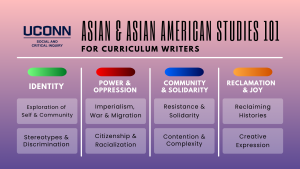 Asian American Studies 101 for Curriculum Writers
Asian American Studies 101 for Curriculum Writers
The AAAS Curriculum Lab presents a Professional Develop workshop for the CT State Department of Education K-8 Social Studies Curriculum Writing Team. Check out the four essential concepts of Asian and Asian American Studies inspired from the San Francisco State University AAS K-12 Framework.
(Sample Lesson) Modern World History | Highschool I | Power & Oppression
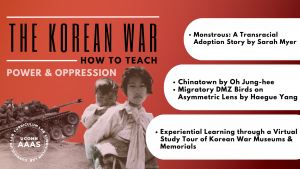 (Placeholder Text) In the high school United States History course, students study both change and continuity as they investigate diverse perspectives and enduring issues in the United States over time. Students will explore United States history from Reconstruction to the Digital Age using disciplinary tools and resources that support the planning and development of inquiries, evaluation of a broad range of historical sources, and communication of knowledge and ideas about the nation’s history.
(Placeholder Text) In the high school United States History course, students study both change and continuity as they investigate diverse perspectives and enduring issues in the United States over time. Students will explore United States history from Reconstruction to the Digital Age using disciplinary tools and resources that support the planning and development of inquiries, evaluation of a broad range of historical sources, and communication of knowledge and ideas about the nation’s history.
- Q: How have conceptions of liberty, equality, and justice changed over time?
- Q: What should be the role of the United States in global events and issues?
Social Studies Standards
 In the high school Modern World History course, students study both change and continuity as they investigate diverse perspectives and the interconnectedness of people and ideas over time. Students will explore topics about cultural exchange, industry and progress, imperialism, global conflicts, decolonization, economic globalization, and global governance using disciplinary tools and resources that support the planning and development of inquiries, evaluation of a broad range of historical sources, and communication of knowledge and ideas about the history of the world.
In the high school Modern World History course, students study both change and continuity as they investigate diverse perspectives and the interconnectedness of people and ideas over time. Students will explore topics about cultural exchange, industry and progress, imperialism, global conflicts, decolonization, economic globalization, and global governance using disciplinary tools and resources that support the planning and development of inquiries, evaluation of a broad range of historical sources, and communication of knowledge and ideas about the history of the world.
- Q: What makes the world modern?
- Q: How do individuals, groups, and nations seek and react to change?
Visit this link for more info on CT Elementary and Secondary Social Studies Standards
Exchange and Interconnections
- MW.His.1.a. Evaluate how historical events and developments were shaped by the movement of individuals and groups during maritime exploration (e.g., Treaty of Tordesillas, Seven Voyages of Zheng He, Columbian exchange).
- MW.His.8.a. Analyze how current interpretations of cultural exchange of the early modern world are limited by the availability of sources and the perspectives represented (e.g., accounts by Gomes de Zurara, Conquistadors, Ogier Ghiselin de Busbecq, Francisco de Almeida, Bartolomé de las Casas, Francis Xavier).
- MW.Geo.6.a. Evaluate the impact of settlement on the environmental and cultural characteristics of the early modern world (e.g., hacienda, encomienda, Jesuit missionaries, East India Company, Ottoman Empire, unification of Japan, Indigenous genocide).
- MW.Eco.5.a. Describe how the Atlantic system affected global trade through cultural diffusion and competition (e.g., de-emphasis of Silk Road, extraction of natural resources, growth of transatlantic slave trade, colonization of the Americas).
Enlightenment and Revolutions
- MW.His.1.b. Evaluate how the Enlightenment and Scientific Revolution shaped institutions in society (e.g., deism, individual liberty, religious tolerance, reason, scientific
method). - MW.His.2.a. Analyze how the diffusion of Enlightenment ideas influenced revolutions (e.g., United States, France, Haiti, Venezuela).
- MW.Geo.1.a. Demonstrate spatial awareness by creating maps to illustrate the environmental characteristics and patterns of trade in early modern world history using digital technologies (e.g., colonialism, enslavement, imperialism, revolution).
- MW.His.1.c. Evaluate the extent to which political and social change was advanced by women in the Enlightenment and Scientific Revolution (e.g., Mary Wollstonecraft,
Margaret Cavendish, Maria Winkleman, Maria Merian). - MW.Civ.2.a. Analyze how theories of government developed in the Age of Enlightenment represented new ideas about the balance between rights of the individual and
power of the government.
Industry and Progress
- MW.His.5.a. Analyze how industrialization gave rise to new ideals and their related policies (e.g., laissez-faire, communism, feminism, socialism, utilitarianism, utopianism).
- MW.His.14.a. Analyze multiple and complex causes and effects of industrialization (e.g., geographic features, technological innovations, access to capital, exploitative foreign policies and impact on native populations, environmental degradation, population trends, labor standards).
- MW.Geo.4.a. Analyze the relationships and interactions between growing industry and physical systems to explain reciprocal influences that occur among them (e.g., air pollution, hydropower, mining, dredging).
- MW.Geo.10.a. Evaluate how the cultural and environmental changes caused by industrialization influenced spatial patterns of trade and land use (e.g., Enclosure Movement, Bombay Spinning and Weaving Company, Treaty of Amity and Commerce, Suez Canal).
- MW.Eco.4.a. Evaluate the extent to which competition for access to resources existed during industrialization (e.g., Chinese tea, silk, and porcelain; South African gold, salt, and ivory; Indian spices and jewels).
- MW.His.14.b. Analyze how the Industrial Revolution impacted the balance of power among nations (e.g., Opium Wars, Sino-Japanese relations prior to and post the Meiji Reformation, Crimean War, Zulu War, Mahdist War, Anglo-German naval arms race, Scramble for Africa).
Global Imperialism
- MW.Eco.1.a. Analyze how access to resources resulted in imperialist policies that had a range of costs and benefits for different groups (e.g., West African diamonds, Middle Eastern oil, Congolese rubber, Indian spices, Panama Canal, Manchuria).
- MW.His.1.d. Evaluate how imperialism was shaped by rivalries between industrialized nation states for political and economic power (e.g., Japan, Great Britain, France, Belgium, Germany).
- MW.His.4.a. Analyze the complex and interacting cultural, religious, and racial factors that influenced perspectives of imperialist policies (e.g., Rudyard Kipling, E. D.
Morel, Dadabhai Naoroji, Boxer Rebellion, Sepoy Rebellion). - MW.Geo.2.a. Explain the relationships between the locations of places and the impact of imperialism using maps and other representations (e.g., social, cultural, economic,
political). - MW.Geo.7.a. Analyze how historical events during imperialism influenced migration patterns and population distribution (e.g., Berlin Conference of 1884-1885, Royal Niger Company, Monroe Doctrine, Battle of Port Arthur).
- MW.Civ.12.a. Investigate how different groups have struggled to gain freedom, equality, and social justice at the national and international levels (e.g., Nelson Mandela, Ho
Chi Minh, Kwame Nkrumah, Indian National Congress).
Global Conflicts and Decolonization
- MW.His.1.e. Evaluate how the causes and effects of World War I influenced global conflicts in the 20th century (e.g., imperialism, industrialization, nationalism, collapse of
empires, communism, socialism, fascism). - MW.His.1.f. Investigate the ways in which antisemitic beliefs and other discriminatory policies in Europe led to the persecution and murder of millions of Jews as well as Roma, disabled people, LGBTQ+ individuals, and political prisoners during the Holocaust (e.g., Nuremberg Race Laws, Final Solution, Aktion T4).
- MW.His.9.a. Synthesize sources from the Holocaust to develop questions and explore the experiences of survivors, victims, resisters, collaborators, bystanders, and rescuers
(e.g., survivor testimony, memoirs, government documents, museums exhibits, historical fiction, and film). - MW.His.15.a. Develop a historical argument about the long-term causes and triggering events that led to World War II (e.g., militarism, nationalism, Treaty of Versailles,
Japanese imperialism, appeasement). - MW.His.2.b. Analyze how changes in military technology impacted the outcomes of various conflicts throughout the 20th century (e.g., barbed wire, bio-chemicals,
flamethrowers, submarines, tanks, aircraft, computer technology, nuclear weapons). - MW.His.1.g. Evaluate how resistance movements and decolonization were shaped by post World War II circumstances and broader historical contexts (e.g., India, Kenya,
Vietnam, Korea, Algeria, Indonesia, Hungary, Germany). - MW.His.2.c. Examine ways in which decolonization altered the balance of power within and among nations (e.g., independence movements, decline of European political
imperialism, economic imperialism, ascendency of United States and Soviet Union as leading world powers). - MW.His.4.b. Analyze complex and interacting factors that influenced the perspectives about international laws and treaties in the Cold War era (e.g., United Nations, Geneva Conventions, North Atlantic Treaty Organization, Warsaw Pact, Nuclear NonProliferation Treaty).
- MW.His.4.c. Analyze the complex and interacting factors that led to genocide during different historical eras (e.g., Armenia, Uganda, Cambodia, Bosnia, Rwanda, Darfur).
- MW.His.5.b. Analyze how developments in multimedia shaped the perspectives of individuals and groups in the 20th century (e.g., comic books, communication technologies, film, propaganda, public service announcements, radio).
- MW.Civ.3.a. Analyze the impact of treaties and laws on the maintenance of national and international order in the 20th century (e.g., Apartheid, European Economic
Community, Camp David Accords, Sino-American Mutual Defense Treaty, Strategic Arms Reduction Treaty, Latin American Integration Association). - MW.Civ.14.a. Analyze means of protecting or limiting human rights in the 20th century (e.g., Universal Declaration of Human Rights, United Nations Resolution 181, Partition of India, Dirty War in Argentina, Cultural Revolution in China, Khmer Rouge, Stolen Generations in Australia).
- MW.Civ.14.b. Analyze historical and contemporary examples of the formation, dissolution or restructuring of governments (e.g., Soviet Union, Israel, Republic of Iran, Zaire, Cuban Revolution, Sandinista National Liberation Front).
MW-6. Economic Globalization and Global Governance
- MW.His.2.d. Analyze the impact of scientific and technological change in the late 20th and early 21st century (e.g., International Space Station, computer technology, vaccines and public health, Global Positioning Systems, cellular technology, Artificial Intelligence).
- MW.His.3.a. Develop questions about strategies used to promote and extend human rights and their significance in both historical and contemporary global contexts (e.g., litigation, lobbying, protests, social media, economic sanctions, diplomacy).
- MW.His.14.c. Analyze the multiple and complex causes and effects of national and global public health issues (e.g., HIV/AIDS, Ebola, reproductive health, addiction, climate change, nutrition, potable water, Covid pandemic).
- MW.Geo.5.a. Evaluate the multinational political and economic agreements that have led to changes in cultural and environmental characteristics among and within nations (e.g., European Union, Kyoto Protocol, Paris Agreement, North American Free Trade Agreement, Trans-Pacific Partnership, International Monetary Fund).
- MW.Geo.8.a. Evaluate how the growth of the global economy has led to changes in settlement patterns (e.g., urbanization, resource scarcity, immigration, emigration, war,
industrial waste). - MW.Geo.9.a. Evaluate the influence of long-term climate variability on contemporary human migration, settlement patterns, resource use, and land use at local-to-global scales (e.g., heat waves, desertification, loss of biodiversity, fish migration, irrigation, wildfires).
- MW.Geo.11.a.Evaluate how economic globalization and the expanding use of scarce resources has led to conflict and cooperation within and among nations and international organizations (e.g., Role of International Monetary Fund austerity policy in Jamaica, 2003 invasion of Iraq, Annexation of Crimea, African Union, Central America-Dominican Republic Free Trade Agreement, International Group of Seven).
- MW.Eco.14.a. Evaluate the effectiveness of the international organizations in sustaining or undermining global cooperation (League of Nations, United Nations,
Organization of the Petroleum Exporting Countries, North Atlantic Treaty Organization, European Union, Asia-Pacific Economic Cooperation, International Court of Justice, Community of Latin American and Caribbean States). - MW.Civ.12.a. Analyze how individuals and groups advocate for economic, political, and social change in international contexts (e.g., legislation, courts, resistance, protest,
boycott, conscious consumerism). - MW.Civ.5.a. Analyze national and international responses to refugee crises sparked by natural disasters, war, and genocide (e.g., Ukraine, Syria, Rohingya, Somalia, Latin
America). - MW.Eco.8.a. Describe an international economic policy in terms of intended and unintended market outcomes (e.g., sanctions, free trade agreements, tariffs).
- MW.Eco.14.a. Analyze the role of comparative advantage in international trade in the late 20th century and early 21st century (e.g., natural resources, labor availability,
infrastructure, capital goods, climate). - MW.Eco.15.a. Explain how free-trade alliances and agreements have affected economic growth in different nations in the late 20th century and 21st century (e.g., standard of living, e-commerce, intellectual property, outsourcing, multinational organizations).
- MW.Civ.5.b. Evaluate the role of various media platforms such as television, newspapers, and social media in shaping reactions to events (e.g., Vietnam War, Tiananmen Square, fall of the Berlin Wall, Arab Spring, Russo-Ukrainian War, 2016 and 2020 U.S. Presidential Elections).
How to Teach the Korean War Webinar
Lesson Plan
How to Teach the Korean War
Three scholars discuss how to teach the Korean War and share lesson plans offering critical context and discussion questions. Access the full Teaching Guide for How to Teach the Korean War
- Lesson 1 - Professor Kimberly McKee
- Teaching Monstrous: A Transracial Adoption Story by Sarah Myer and In the Matter of Cha Jung Hee
- Lesson 2 - Professor Na-Rae Kim
- Teaching Oh Jung-hee’s “Chinatown” and Haegue Yang’s Migratory DMZ Birds on Asymmetric Lens – Kyott Kyott Vessel (Pale Thrush)
- Lesson 3 - Professor Suzy Kim
- Experiential Learning through a Virtual Study Tour of Korean War Museums & Memorials
- Local CT Resource Handbook - Professor Jason Oliver Chang
- Explore the Demographics of Korean Americans in Connecticut
- Explore Stories about Korean Americans in Connecticut
- Explore Local Korean War and Korean War Veterans Memorials
- Explore the Borinqueneers of Connecticut
- Explore how one Connecticut Manufacturer Supplied Machines to the Korean War
